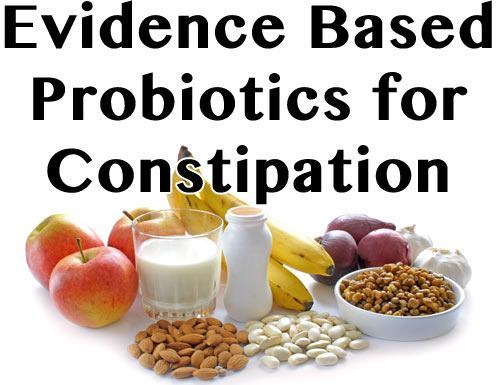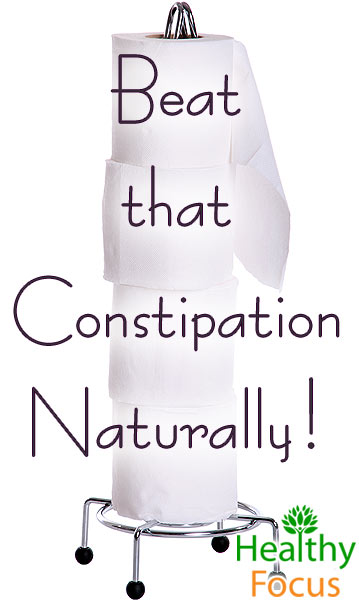Last Updated on January 18, 2018 by Marc Seward
Constipation is a problem that few people enjoy talking about but one that affects many people. Estimates suggest that around 15% of adults are affected at some time or another and it can be a very frustrating and often uncomfortable complaint.
Constipation is traditionally treated with commercial laxative products or stool softeners but unfortunately, these treatments have mixed results. According to polling estimates, nearly half of their users are dissatisfied with the result they experience from using these products and many sufferers end up looking for alternative treatments including diet and exercise regimens.
Can probiotics help relieve constipation?
Probiotics are the good or beneficial bacteria that reside among the millions of bacterial strains in the gut. The good bacteria can be found naturally in certain fermented products like yogurts and fermented vegetables but many people are turning to the growing range of probiotic supplements on offer.
The most common beneficial bacteria in our bodies are the Bifidobacterium and Lactobacillus species many of the supplements on offer contain these species. Because the make-up of our gut bacteria is often thrown out of balance by factors including the use of antibiotics or viral infection illnesses can occur.
We can use probiotics to restore the balance and help recover from illnesses that commonly affect the digestive system like diarrhea, inflammation and also constipation which is such a common condition that it results in over 3 million hospital visits a year in the US.
A review of the research into probiotics as a treatment for constipation was recently carried out by King’s College of London. The researchers found that 14 clinical studies met the criteria of a well-conducted study. All 14 studies used human subjects and randomly prescribed either probiotics or a placebo to the patients who suffered with constipation.
What the researchers found was both interesting and promising. On average probiotics slowed down transit time in the gut by over 12 hours and resulted in an increased weekly bowel movement. Probiotics also helped to soften the stools which made their passage more comfortable. Among the probiotics used in these studies, products containing Bifidobacterium were most effective. (1)
In spite of these results, the research was generally small scale and according to the Director of the Nutrition Division at Harvard; Dr. Allan Walker they should be treated with caution. According to Dr.Walker there is still insufficient evidence to recommend a particular probiotic and the results of the 14 trials when examined individually gave widely varying results.
In spite of these reservations, he believes that probiotics have a helpful part to play in the future treatment of constipation and recommends a large scale trial to determine which particular probiotic species is the best treatment and the precise recommendations for dosage and length of treatment. He goes on to say that probiotics are very likely safe and that no adverse reactions have been reported so until we glean more specific information, experimenting with your probiotics use is fine.
How do probiotics work?
Some probiotic species produce both lactic acid and short chain fatty acid which help reduce the pH level of the colon. This improves muscle contractions in the colon which improves the regularity of bowel movements. Research so far has shown that the Lactobacillus and Bifidobacterium species of bacteria are the most useful in treating constipation.
These species can improve bowel movement regularity as well as mucous excretion by transforming bound bile salt into free salt. When the salts are freed they help pull more water into the colon which makes the stools softer and help them to be passed far more easily.
Because there are so many possible causes for constipation it remains that no one probiotic will be effective in each situation. The effects of the probiotics may also depend on which strain is used and in what combination. You may find that a combination of probiotic strains is effective and many experts recommend experimenting. Finding the right solution is likely to take a certain amount of trial and error.
The probiotic strains below might be able to help you relieve your constipation and their effects have been researched to one extent or another. Hopefully this will information will help you make an informed choice.
Bifidobacterium lactis
Many strains of bifidobacterium lactis have been researched in regard to their use for constipation relief.
- B lactis BB-12 has repeatedly demonstrated effectiveness in constipation relief. Several clinical trials have investigated its use in clinical trials including one with elderly constipation patients and another with irritable bowel syndrome patients. The results have been generally positive with significant improvements in symptoms being experienced. (2)
- B.Lactis DN-173 010 has also been well researched including the largest study done to date. 267 patients with IBS were involved in the study and following 6 weeks of treatment researchers found a significant increase in bowel movement frequency and other constipation symptoms.
However, another trial found that this strain had no noticeable effect on constipated children. (3)
Bifidobacterium animalis
Several studies have been done into the effects of B.animalis on constipation. One study conducted used 70 adult subjects and treated them with a daily dose of milk that was fermented with B.animalis. After 11 days of treatment researchers demonstrated that it caused a significant reduction in colon transit time. (4)
Bifidobacterium longum
This species of probiotic has also demonstrated some potential to improve constipation.
One large scale trial involving 636 adult patients who were suffering from IBS constipation problems were treated with B.longum and fructooligosaccharides. By the end of the trial most of the subjects experienced an improvement in frequency of bowel movement and stool consistency. (5)
Lactobacillus plantarum
Some L. plantarum strains have been well researched with regard to irritable bowel syndrome and have become increasingly popular remedies for IBS. Not all strains have been trialed clinically and while they show potential for the treatment of IBS and abdominal bloating.
Two specific strains known as L. plantarum SN35N and SNi3T have demonstrated the ability to improve the symptoms of constipation in a trial involving 68 adult patients. (6)
Lactobacillus casei rhamnosus
One strain of this species known as LGG has proven health benefits including the reduction of constipation but results have been mixed. Some studies have shown that it can help relieve constipation with others showing that it has no effect including one study involving children.
Probiotics for treating constipation in children
Unfortunately, constipation is a very common and upsetting condition in children and infants. Certain studies have demonstrated that some specific probiotic strains can be very effective especially for children.
Lactobacillus casei shirota
This probiotic strain can be found in certain yogurt drinks commonly found in the supermarket. A study undertaken by the University of Naples evaluated the effects of this strain on 44 infants who were suffering from chronic constipation and found it to be effective. (7)
Another study done on adults confirmed the positive effects of this strain with regard to adults. The double blind trial which involved 70 adults suffering from chronic constipation found that it significantly improved their symptoms. (8)
Bifidobacterium infantis
Along with Bifidobacterium bifidum, this is one of the major beneficial bacterial species in the gut flora of infants. One study involving children demonstrated that a specific strain of this species of probiotic called B.infantis 35624 helped increase the frequency of bowel movements in the children treated with it when compared to those treated by a placebo.
(1) http://ajcn.nutrition.org/content/early/2014/08/06/ajcn.114.089151.full.pdf
(2) http://www.ncbi.nlm.nih.gov/pmc/articles/PMC2645989/
(3) http://www.ncbi.nlm.nih.gov/pubmed/19296845
(4) http://www.ncbi.nlm.nih.gov/pubmed/18801055
(5) http://www.ncbi.nlm.nih.gov/pubmed/17108864
(6) http://www.ncbi.nlm.nih.gov/pubmed/19628371
(7) http://www.ncbi.nlm.nih.gov/pubmed/17587273
(8) https://www.rima.org/web/medline_pdf/can%20j%20gastroenterol_655.pdf



Leave a Reply
You must be logged in to post a comment.